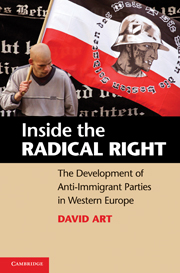Book contents
- Frontmatter
- Contents
- Preface
- Abbreviations
- 1 Introduction
- 2 Activists and Party Development
- 3 Parties of Poor Souls
- 4 Nationalist Subcultures and the Radical Right
- 5 Party Transformation and Flash Parties
- 6 Reforming the Old Right?
- 7 Conclusion
- Appendix A Percentage of the Vote for Radical Right Parties in National Parliamentary Elections
- Appendix B Coding Procedure for Radical Right Party Lists
- Appendix C ISCO Codes for Radical Right Candidates for Office
- Bibliography
- Index
2 - Activists and Party Development
Published online by Cambridge University Press: 05 June 2012
- Frontmatter
- Contents
- Preface
- Abbreviations
- 1 Introduction
- 2 Activists and Party Development
- 3 Parties of Poor Souls
- 4 Nationalist Subcultures and the Radical Right
- 5 Party Transformation and Flash Parties
- 6 Reforming the Old Right?
- 7 Conclusion
- Appendix A Percentage of the Vote for Radical Right Parties in National Parliamentary Elections
- Appendix B Coding Procedure for Radical Right Party Lists
- Appendix C ISCO Codes for Radical Right Candidates for Office
- Bibliography
- Index
Summary
What are the critical differences among radical right activists? How do different types of activists influence a party's development and its electoral performance? What explains the variation in the number and type of activists across parties and across countries? This chapter addresses these three questions in turn and in so doing lays out the theoretical model that the case studies illustrate.
Although the argument is specific to radical right parties, it both draws from studies of other types of political parties and develops a set of general propositions that are also relevant to them. Rather than viewing parties through the lens of the unitary rational actor or the dichotomy of “leaders” and “followers,” I divide activists into three ideal types based on their ideological motivations: extremists, moderates, and opportunists. I also distinguish among activists on the basis of both their education and their political experience, under the assumption that some people bring a wider set of skills to party politics than do others. The general distribution of activists within parties, I then argue, helps determine their ability to mount effective electoral campaigns, manage factionalism, exhibit competence, gain legitimacy, and offer a message that maximizes the party's appeal among voters. Activists thus provide the microfoundations for a theory of radical right party development. As stated previously, I take it as a given that a combination of sociostructural changes in the 1970s and 1980s – particularly the rising salience of immigration – led both to voter demand for radical right parties and to the formation, or transformation, of parties to fill that demand.
- Type
- Chapter
- Information
- Inside the Radical RightThe Development of Anti-Immigrant Parties in Western Europe, pp. 29 - 60Publisher: Cambridge University PressPrint publication year: 2011



